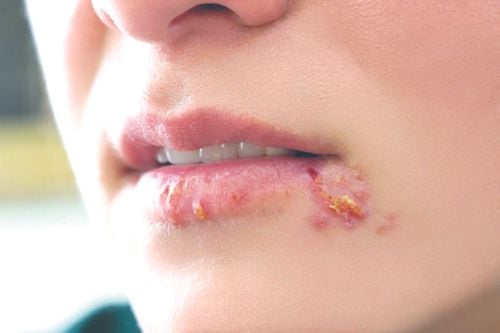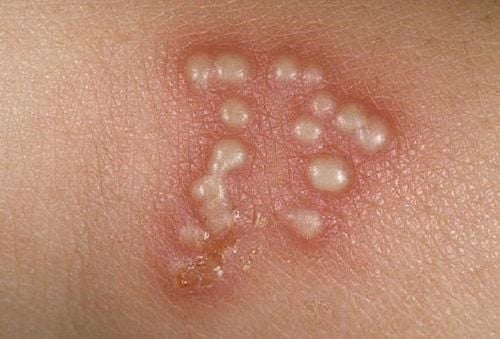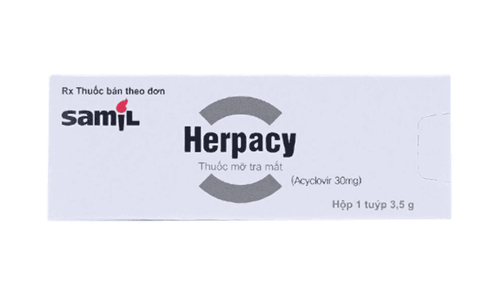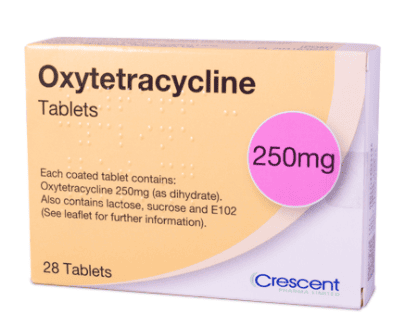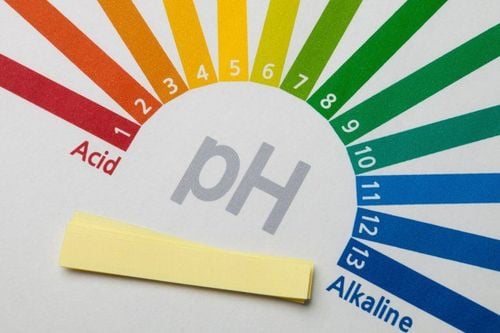This is an automatically translated article.
Genital herpes often has no symptoms, so an infected person can become infected and infect others without even knowing it. Without adequate testing, there is a very high risk of infecting a sexual partner. Timely diagnostic testing for genital herpes helps to reduce the severity of the disease and accelerate the healing of herpes.1. Symptoms of genital herpes
Symptoms of genital herpes are small blisters or papules on the lining of the anus or genital area (in the vulva, penis and scrotum). Clustered vesicles may progress to ulcers; often accompanied by sharp pain, burning sensation and local itching. The disease is highly contagious during an outbreak until the lesions heal completely. Herpes that grow around the genitals can be transmitted by skin-to-skin contact, so even if you use a condom, you can still get genital herpes from sex.
When the disease recurs, the patient has fever, headache, body fatigue, aching limbs, swollen lymph nodes, muscle pain, poor appetite. More rarely, some men with genital herpes may have additional symptoms of pus discharge from the stoma, for women, more vaginal discharge, with a bad odor. People with genital herpes when having sex will have burning pain, decreased pleasure, painful urination, frequent urination many times a day, more severe can urinate blood or pus.
2. Diagnostic tests for genital herpes
Tests used to diagnose or screen for genital herpes include:PCR test : A PCR test can tell if a person has genital herpes even if the person has no symptoms. The PCR test looks for fragments of viral DNA in a patient sample taken from cells or fluid from a genital or urinary tract sore. This is a test commonly used to diagnose genital herpes and is very accurate.

Xét nghiệm PCR có thể cho biết người bệnh có mắc mụn rộp sinh dục ngay cả khi người bệnh không có triệu chứng
Cell culture : During the physical examination, the doctor will order a sample of cells from the ulcer and look for the herpes simplex virus (HSV) under the microscope. A cell culture or PCR test may give a false negative result if the ulcer has already begun to heal or if the person is newly infected. A false-negative test indicates that the patient is not infected with the Herpes virus when in fact the patient is infected. There is also a false positive test result, which means that the result is positive, but in fact the patient is not infected with the herpes virus.
Other tests Blood tests can detect antibodies to the Herpes virus, which are proteins made by the immune system in response to an infection. With direct immunofluorescence, a solution containing HSV antibodies and a fluorescent dye is added to a specimen suspected of having herpes virus infection. If the virus is present in the specimen, the antibodies stick to it and glow when viewed under a specialized microscope. The test cannot tell when a person is infected with the virus and it can take several weeks for antibodies to form.
Antibody tests can tell the difference between two Herpes viruses. It is important to know what type of herpes virus the patient has. If infected with type 2 (HSV-2), the person may have flare-ups more often than with type 1 (HSV-1) and also cause cold sores to appear on the lips and around the mouth.
3. What to do after being diagnosed with genital herpes?
Being diagnosed with genital herpes can be confusing, embarrassing, and angry. The sick person may be suspicious or resentful of his or her spouse/partner if the sick person thinks he or she has infected them. Or the person may fear rejection by a current or future partner.
The emotions mentioned above will most often be experienced in patients who have been diagnosed with genital herpes. Here are the right ways to deal with genital herpes:
Talk to your partner. Be open and honest about your feelings. Trust your partner and believe what he or she tells you. Don't blame. Genital herpes can stay dormant in the body for many years, so it is often difficult to determine when an infected person was infected and who transmitted the infection to them. Educate yourself. Talk to your doctor or counselor to learn how to live with this condition and minimize your chances of infecting others. Learn about treatment options and how to cope with flare-ups.

Khám bác sĩ để điều trị kịp thời
Once you have genital herpes, there are many treatments to limit outbreaks but cannot completely eliminate the virus, because the virus will stay in the body for life. Women who have had herpes before and want to become pregnant, must inform their doctor about their condition so that they need to be treated according to specialists, to avoid any risk of infection to the baby. Primary herpes and cervical herpes often cause miscarriage and premature delivery.
To prevent genital herpes, it is necessary to take measures such as: keep the body clean. Have faithful sex with a safe partner. Use condoms when having sex. If you have sex through your mouth, you must use a mouth guard. Maintain personal hygiene before and after sexual intercourse. Do not share needles or other items containing blood, mucus or pus from a person suspected of being infected... If you suspect that you and your partner have symptoms of genital herpes, go to your doctor for treatment. best fit.
Package of Social Diseases Examination and Screening of Vinmec International General Hospital helps customers to screen for social diseases in order to detect diseases early for effective treatment and avoid complications.
Please dial HOTLINE for more information or register for an appointment HERE. Download MyVinmec app to make appointments faster and to manage your bookings easily.
Reference source: Webmd.com




